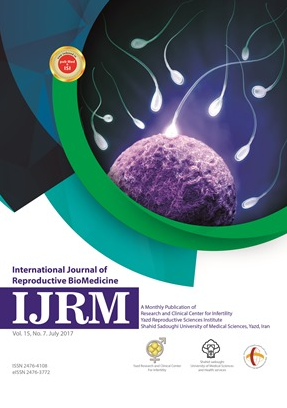
International Journal of Reproductive BioMedicine
ISSN: 2476-3772
The latest discoveries in all areas of reproduction and reproductive technology.
Effect of adding letrozole to gonadotropin on in vitro fertilization outcomes: An RCT Running
Published date: May 05 2020
Journal Title: International Journal of Reproductive BioMedicine
Issue title: International Journal of Reproductive BioMedicine (IJRM): Volume 18, Issue No. 4
Pages: 287–294
Authors:
Abstract:
Background: Aromatase inhibitors prevent the aromatization of androgens into estrogens, which reduces the negative feedback of estrogen on the hypothalamicpituitary axis. It is clear that increasing the secretion of follicle-stimulating hormones results in an increased follicular growth.
Objective: This study aimed to evaluate the effect of adding letrozole to gonadotropin on in vitro fertilization outcomes in normal responders.
Materials and Methods: In this randomized clinical trial, 100 normal responder women candidate for controlled ovarian stimulation were randomly enrolled in two groups (n = 50/each). In the case group letrozole was added to gonadotropin in the antagonist protocol. The control group received the conventional antagonist protocol. The main outcome was clinical and chemical pregnancy; and the second outcomes were the number of mature oocytes, the fertilization rate, estradiol level, and the total dose of gonadotropins.
Results: Basic clinical and demographic features were comparable between the groups. Estradiol level on the day of human-chorionic-gonadotropin administration and the total gonadotropin consumption were significantly higher in the control group than the case group (p = 0.045). In addition, the number of MII oocytes was higher (but not significantl) in the case group than the control group (p = 0.09). Moreover, the endometrial thickness was significantly lower in the case group. There were no significant differences in fertilization rate and chemical and clinical pregnancy rates between the two groups.
Conclusion: Although adding letrozole to gonadotropin in normal responders reduces the total dose of gonadotropin, it does not improve the pregnancy outcomes.
Key words: Letrozole, Ovarian stimulation, Pregnancy.
References:
[1] Haas J, Casper RF. In vitro fertilization treatments with the use of clomiphene citrate or letrozole. Fertil Steril 2017; 108: 568–571.
[2] Bastu E, Buyru F, Ozsurmeli M, Demiral I, Dogan M, Yeh J. A randomized, single-blind, prospective trial comparing three different gonadotropin doses with or without addition of letrozole during ovulation stimulation in patients with poor ovarian response. Eur J Obstet Gynecol Reprod Biol 2016; 203: 30–34.
[3] Garcia-Velasco JA, Moreno L, Pacheco A, Guillén A, Duque L, Requena A, et al. The aromatase inhibitor letrozole increases the concentration of intraovarian androgens and improves in vitro fertilization outcome in low responder patients: a pilot study. Fertil Steril 2005; 84: 82–87.
[4] Ecemis T, Tasci Y, Caglar GS. Controlled ovarian hyperstimulation with sequential letrozole cotreatment in normo/high responders. Gynecol Endocrinol 2016; 32: 206–209.
[5] Ebrahimi M, Akbari-Asbagh F, Ghalandar-Attar M. Letrozole+ GnRH antagonist stimulation protocol in poor ovarian responders undergoing intracytoplasmic sperm injection cycles: An RCT. Int J Reprod Biomed 2017; 15: 101–108.
[6] Davar R, Oskouian H, Ahmadi S, Firouzabadi RD. GnRH antagonist/letrozole versus microdose GnRH agonist flare protocol in poor responders undergoing in vitro fertilization. Taiwan J Obstet Gynecol 2010; 49: 297–301.
[7] Verpoest WM, Kolibianakis E, Papanikolaou E, Smitz J, Van Steirteghem A, Devroey P. Aromatase inhibitors in ovarian stimulation for IVF/ICSI: a pilot study. Reprod Biomed Online 2006; 13: 166–172.
[8] Haas J, Bassil R, Gonen N, Meriano J, Jurisicova A, Casper RF. The VEGF and PEDF levels in the follicular fluid of patients co-treated with LETROZOLE and gonadotropins during the stimulation cycle. Reprod Biol Endocrinol 2018; 16: 54.
[9] Mai Q, Hu X, Yang G, Luo Y, Huang K, Yuan Y, et al. Effect of letrozole on moderate and severe earlyonset ovarian hyperstimulation syndrome in highrisk women: a prospective randomized trial. Am J Obstet Gynecol 2017; 216: e1–e42.
[10] Pereira N, Hancock K, Cordeiro CN, Lekovich JP, Schattman GL, Rosenwaks Z. Comparison of ovarian stimulation response in patients with breast cancer undergoing ovarian stimulation with letrozole and gonadotropins to patients undergoing ovarian stimulation with gonadotropins alone for elective cryopreservation of oocytes. Gynecol Endocrinol 2016; 32: 823–826.
[11] Goldrat O, Gervy C, Englert Y, Delbaere A, Demeestere I. Progesterone levels in letrozole associated controlled ovarian stimulation for fertility preservation in breast cancer patients. Hum Reprod 2015; 30: 2184–2189.
[12] Quinn MM, Cakmak H, Letourneau JM, Cedars MI, Rosen MP. Response to ovarian stimulation is not impacted by a breast cancer diagnosis. Hum Reprod 2017; 32: 568–574.
[13] Ozcan Cenksoy P, Ficicioglu C, Kizilkale O, Suhha Bostanci M, Bakacak M, Yesiladali M, et al. The comparision of effect of microdose GnRH-a flare-up, GnRH antagonist/aromatase inhibitor letrozole and GnRH antagonist/clomiphene citrate protocols on IVF outcomes in poor responder patients. Gynecol Endocrinol 2014; 30: 485–489.
[14] Song Y, Li Z, Wu X, Wang X, Xiao J, Wang B. Effectiveness of the antagonist/letrozole protocol for treating poor responders undergoing in vitro fertilization/intracytoplasmic sperm injection: a systematic review and meta-analysis. Gynecol Endocrinol 2014; 30: 330–334.
[15] Eftekhar M, Mohammadian F, Davar R, Pourmasumi S. Comparison of pregnancy outcome after letrozole versus clomiphene treatment for mild ovarian stimulation protocol in poor responders. Iran J Reprod Med 2014; 12: 725–730.
[16] Lazer T, Dar S, Shlush E, Al Kudmani BS, Quach K, Sojecki A, et al. Comparison of IVF outcomes between minimal stimulation and high-dose stimulation for patients with poor ovarian reserve. Int J Reprod Med 2014; 2014: 581451.
[17] Mukherjee S, Sharma S, Chakravarty BN. Letrozole in a low-cost in vitro fertilization protocol in intracytoplasmic sperm injection cycles for male factor infertility: A randomized controlled trial. J Hum Reprod Sci 2012; 5: 170–174.
[18] Haas J, Bassil R, Meriano J, Samara N, Barzilay E, Gonen N, et al. Does daily co-administration of letrozole and gonadotropins during ovarian stimulation improve IVF outcome? Reprod Biol Endocrinol 2017; 15: 70–75.
[19] Chan WS, Dixon ME. The “ART” of thromboembolism: a review of assisted reproductive technology and thromboembolic complications. Thromb Res 2008; 121: 713–726.
[20] Casper RF, Mitwally MFM. Aromatase inhibitors for ovulation induction. J Clin Endocrinol Metab 2006; 91: 760–771.